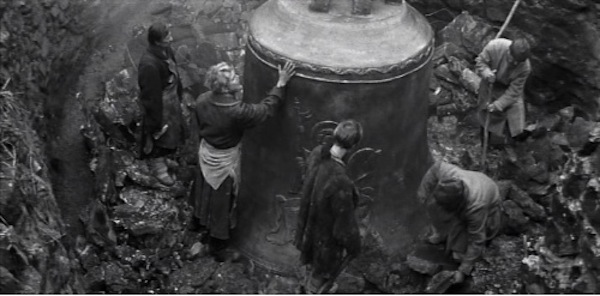One of the greatest scenes in the history of cinema comes at the end of an obscure Russian movie about a medieval icon painter, Andrei Rublev. The film, written and directed by Andrei Tarkosvsky in Soviet Russia (an unlikely Dostoevsky among directors in a secular age), tells the story of the painter and his struggles in seven episodes spanning the period from his early adulthood to old age. The seventh and final episode of the film, entitled “The Bell”, focuses on a young man, the orphaned son of a blacksmith, who claims to know the secret of making bells.
We watch the young man meticulously plan out the process of making a new bell for the local church. He chooses the clay for the mold, fights for the right proportion of precious metals in the alloy, designs the mold. His instructions are confident and exacting. We believe that he knows exactly what he is doing.
But when the bell is cast and the local nobles come to see its first ringing, a sudden terror strikes the young man. He refuses the honor of ringing it the first time, and instead stares onward in terror as one of the laborers crawls under the mass of metal to slowly swing the bell’s clapper back and forth. As it builds momentum, the nobles are overhead expressing their doubts: this is no bell; a mere peasant boy could never accomplish such a feat. Apparently our hero agrees, since he has sunk to the ground in terror awaiting his fate. The prince will behead him if he has failed.
Back and forth the clapper swings, until finally it sounds, with a resounding and joyful clang, and the surrounding crowd breaks into cheers. The hero collapses into the mud, weeping. We do not know why.
Rublev walks up to him, props him up, and comforts him. The young man is sobbing. “My father never told me the secret of making bells! He took it to the grave, the old snake!” And suddenly we understand the agony of the young man. He had never expected the bell to ring. He thought his efforts would fail, and that his work was merely an invitation to death. But somehow he was given the knowledge to achieve what by rights he should never have been able to do. The miraculous success of his endeavor has made him more aware than ever of his own shameful inadequacy.
This scene expresses something so profound and beautiful that I can never watch it without shedding tears. I believe that “The Bell” shows us what it is to be saved. We labor with the knowledge we have been given, with hope that somehow the task will be completed, but the awareness that what we have to offer cannot be sufficient to accomplish it. And so, the more earnestly we labor in hope, the more earnestly we sorrow over our own weaknesses, terrified of failing, but cleaving to the principles we have received. And in the end, when all is fulfilled, we must admit that salvation, though accomplished through our works of love, was only possible because of a direct supernatural help, bringing our shadowy knowledge and love to infinite perfection, enabling something weak and imperfect to find its end in the true vision of God for all eternity. What could confirm in a more terrifying way the ineptitude and corruption of our nature than its redemption, beyond all natural hope, and elevation to eternal life?
Today, and throughout this life, we wait in expectation of that final blessing, working out our salvation in fear and trembling, uncertain of the joy or tragedy of the drama’s final scene, but full of divine hope!













